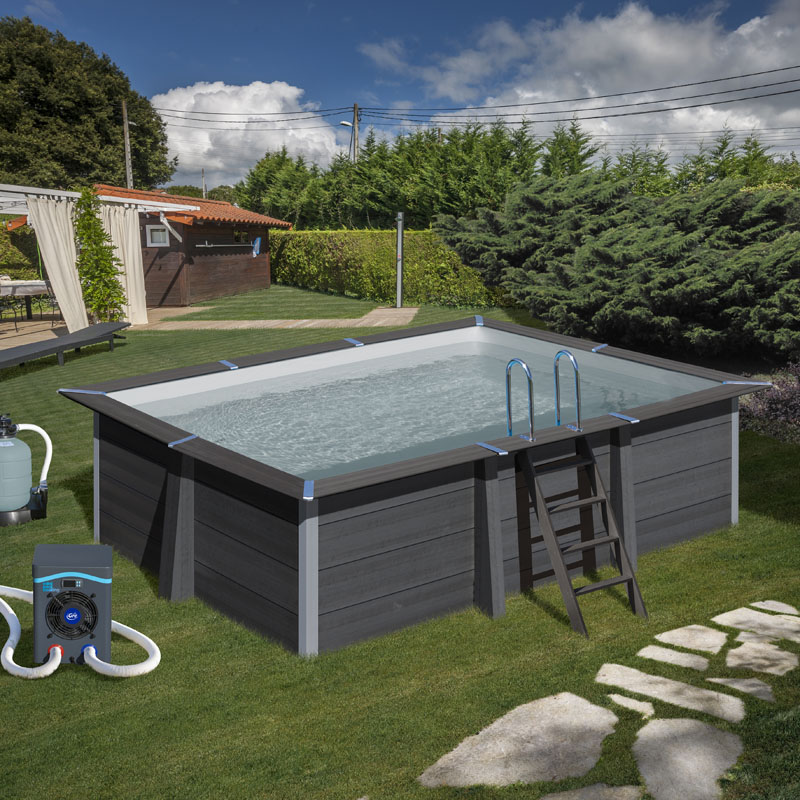Heating system
Choose your heat pump
Which heat pump is best suited to your pool?
Extend your pool season with a heat pump.
If you are thinking of heating your pool to keep the water at a comfortable temperature, we will tell you which heat pump is best suited to your pool.
One of the most effective methods of heating pool water is the pump. But there are different types, so it is necessary to know the characteristics of your pool and also the types of pumps available on the market.

Characteristics of the pool
When buying a heat pump, certain aspects of your pool will condition the purchase and it is important to be clear about them.
Size and shape
The size of the pool must be taken into account as not all pumps have the same power and therefore will not offer the same heat to all pools. In addition to traditional heat pumps, there are mini heat pumps, which are more economical and can heat small volumes of water.

Heat pumps are suitable for all types of pools, regardless of their shape. Whether the pool is made of wood, composite, or steel, heat pumps are prepared to cope with all materials. However, what is important to bear in mind is whether the pool is above ground or in-ground, as the water will behave differently in each of them.
Territory
Climate and humidity are also factors when buying a heat pump. If the pool is located far from the sea, it will probably be located at a certain altitude, which causes the water temperature to vary.
In addition, it will also be related to the wind; if the pool is located in a windy area, the water temperature will be lower and therefore a heat pump with more power will be necessary.
Durability
By durability, we are not referring to the lifespan of each pool, but to how long we want to extend the swimming season. This will also determine the type of heat pump we need.
If you live in a warm climate all year round and want to maintain your pool for 12 months, it is easier to opt for a standard heat pump. However, if your pool is in a colder climate and you can only extend the pool season a few months beyond the summer, you will probably need a pump that heats sufficiently when it is cold outside.
Heat pump features
Power
The power of the heat pump helps to establish the amount of heat that the heat pump can transmit to the pool water. The temperature of the water as well as the outside air must also be taken into account.
The power is measured in kW and to know how many kW we need, we need to know the cubic metres of our pool. Depending on this, we will need more or less power for our heat pump.

Coefficient of performance (COP)
The coefficient of performance is based on a formula that defines the heat output of our pump and the power it consumes.
COP = heat output/power consumption
Therefore, the higher the COP of a heat pump, the more powerful the heating system will be and the more efficient it will be, and therefore the more economical it will be.
Defrost
The heat pump works by taking into account both the water temperature and the outdoor temperature. This means that when the outside temperature is low, the efficiency of the pump is lower because the evaporator may freeze.
To avoid this, the pumps have two defrost systems:
Defrost through ventilation: the pump has fans that start in the presence of frost to prevent it from freezing. This method is effective in open-air pools and when temperatures do not drop too low.
Reverse cycle defrosting: the pump takes the heat it has generated from the pool water and uses it to remove any frost that appears. This type of defrosting is most effective in indoor pools as it requires a high pool water temperature.
Reversible function
There are also range of swimming pool heat pumps with a reversible or inverter function. It allows the heat pump to cool the pool water in case of very high temperatures and very hot pool water. It will allow you to have a more refreshing swim.
As you can see, choosing a heat pump for your pool can be a complicated task if you don't have the necessary information to buy one. Take a look at our pool heaters and choose the one that best suits your pool.
